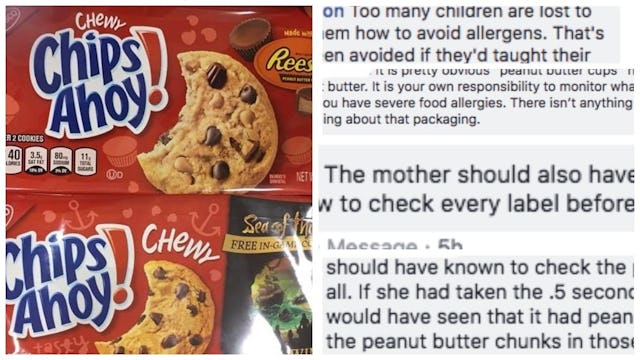'Perfect Parents' Of The Internet, Step Away From Your Keyboards

If you’re blaming a 15-year-old for her own allergy death, you should step away from your keyboard.
A 15-year-old girl died after mistaking peanut Chips Ahoy packaging for nut free. She was at a friend’s party, and the packaging was pulled back essentially hiding the Reese’s logo. The red packaging is similar to packaging the company uses for their “Chewy” variety.
If you’ve ever bought a package of Chips Ahoy, you know that when you pull back the top, nothing is exposed but the cookies themselves. Missing the labeling on the packaging is really not that difficult. And it’s what happened to this child. Her mother shared the story, in hopes of warning other parents.
Related: Peanut Allergies In Kids: A Comprehensive Guide To Symptoms, Testing, Treatment, And More
“Our whole lives we dedicated to keeping our child safe from one ingredient, peanuts.
On Monday June 25, our 15 year old daughter, Alexi Ryann Stafford, while at a friends house, made a fatal choice. There was an open package of Chips Ahoy cookies, the top flap of the package was pulled back and the packaging was too similar to what we had previously deemed “safe” to her. She ate one cookie of chewy Chips Ahoy thinking it was safe because of the “red” packaging, only to find out too late that there was an added ingredient…. Reese peanut butter cups/chips.”
The grieving mother shared her story, along with a picture of the Chips Ahoy packaging to do one thing and one thing only — raise awareness. She never blamed the company. She never demanded a design change. She simply shared her heartbreak so that no other parent would be left in the situation she’s in — grieving their child.
Her story continues,
“She ate one cookie of chewy Chips Ahoy thinking it was safe because of the “red” packaging, only to find out too late that there was an added ingredient…. Reese peanut butter cups/chips. She started feeling tingling in her mouth and came straight home. Her condition rapidly deteriorated. She went into Anaphylactic shock, stopped breathing and went unconscious. We administered 2 epi pens while she was conscious and waited on paramedics for what felt like an eternity.
She died within 1& 1/2 hour of eating the cookie.”
We shared this story yesterday, and immediately comments began rolling in about how it’s “not the company’s fault” and how her child should’ve “known better.” There are 19,000 comments on the mother’s original post — many of them chiding a family who has spent 15 years managing a life threatening allergy. Imagine being someone who could direct words so devoid of empathy at a grieving mother.
Image via Facebook
“At what point do we start doing better and teaching our kids to do better?” Wow. I’m asking myself that same question right now. You don’t think a family who’s navigated a life-threatening allergy for 15 years has spent more time than any of us meticulously directing their kids for their own safety?
Image via Facebook
“If she’d taken .5 seconds to flip the flap back…” Wow. Just, wow. A child is dead. A family is grieving.
Image via Facebook
“There isn’t anything confusing about that packaging.” Actually, there is. Anyone who regularly buys Chips Ahoy knows that the crunchy variety is in the blue package, and the chewy variety is in the red package. Not everyone knows how many flavor options there are now, however.
And here’s the chewy variety:
Image via Amazon
Overlooking this packaging simply isn’t a hard mistake to make. But apart from that, have we no common decency? When a parent loses a child, should our first thought really be how to argue them down? Point out all the ways in which they could have “done better?”
The truth is, terrible things happen every, single, day. And no one knows that better than parents who have spent the entirety of their child’s life navigating a deadly allergy, only to meet the nightmare scenario they prayed would never come. Anyone who doesn’t have a child who has to navigate such a thing should feel nothing but gratitude for their own situation and absolute sympathy for parents who do. Period.
Maybe we think that if we convince ourselves these tragic accidents are someone’s “fault” — then they can never happen to our children. But the fact is, they can. It takes a moment — and any of us who haven’t experienced the horror of knowing what one moment, one slip, can take from us should simply realize that we are lucky. Lucky.
That’s all.
This article was originally published on